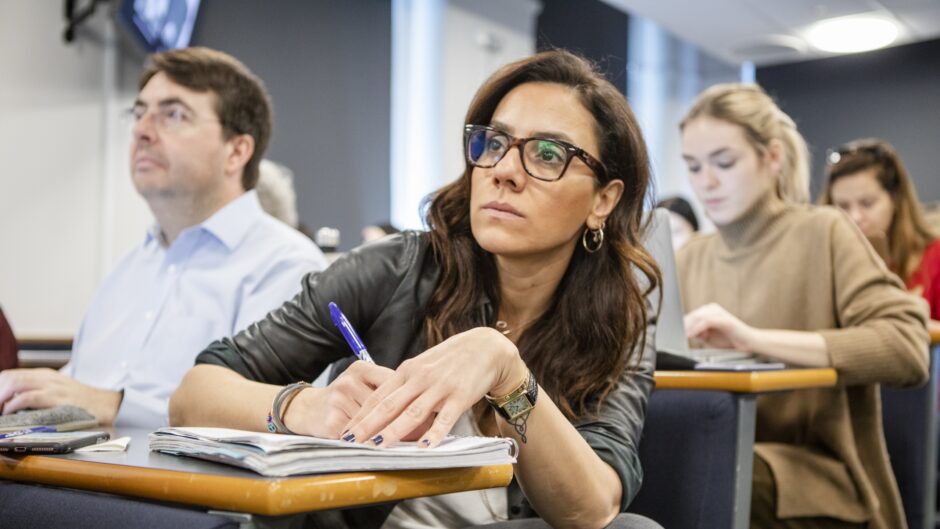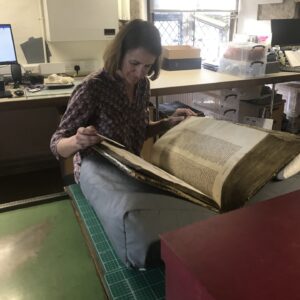Course Overview
Status
Applications open - apply by April 2026
Location
Vernon Square Kings Cross, London WC1X 9EP
Duration
Full-time: Nine-months, Sept 2026 – June 2027. Part-time: Sept 2026 – June 2028.
Awarding body
University of London
Intake
Up to 25 full-time students, and up to 20 part-time students
Are you interested in exploring Art History? Are you looking to combine your skills and knowledge from a previous career or discipline with the art world? Or keen to study art history out of pure interest and personal development?
The Graduate Diploma is a concentrated form of the undergraduate degree and gives graduates of other disciplines the opportunity to apply their existing skills to the study of Art History. The curriculum offers teaching across an unrivalled breadth of periods and cultures. You will have the opportunity to study art and architecture from late antiquity to the present, and from across the globe: from Byzantium to the Early Modern Islamic World, from Medieval and Renaissance Europe from the Buddhist Arts of Asia, to Contemporary China to Black Art Histories.
Our teachers are researchers at the cutting edge of their areas of specialism and they share their knowledge, discoveries and ideas with you in seminars, lectures, gallery visits and tutorials. The modules we teach are directly shaped by the tutor’s research and partly for that reason change from year to year – modules outlined below are therefore indicative of subjects that may be on offer.
The Courtauld Graduate Diploma in the History of Art is designed to equip students who hold an undergraduate degree or equivalent in another discipline with the broad art historical knowledge and transferable skills needed to engage critically with art historical debates, transition into a career in the arts, or undertake further post-graduate study.
The programme is supported by a personal tutor and by study sessions and workshops on topics such as reading art historical texts and essay writing. Students have access to all that the Courtauld has to offer, including world-class events run by the Research Forum, careers events and one-to-one sessions with professional writers. In addition to the compulsory elements of the programme, you are welcome to attend lectures from other programmes, including other optional modules which range across art historical periods and approaches to the discipline.
The Graduate Diploma can be taken either as a full-time nine-month programme over two semesters, or part-time over two years (four semesters). Part-time students are required to attend in-person two days each week for discussion classes and seminars; lectures may be watched remotely.
Teaching Programme and Structure
In each semester, you will take a ‘Foundations’ module, offering a broad picture of art historical themes and methods. You will also take two further core modules, examining works of art as physical objects (Physical Histories) and scrutinising the role that museums play in society (Exhibiting Art). Alongside these, you will take a selection of modules across the two semesters, devoted to looking in depth at themes, periods and approaches in the History of Art (Histories and Approaches). Finally, you will write a 5,000-word dissertation, supported by a supervisor, which allows you to explore a particular issue and develop your independent research skills. The teaching is a mixture of lectures (with up to 150 students) and seminars (in groups of 10–15 students).
The Graduate Diploma consists of the following elements:
Foundations 1 and 2: A series of lectures, dealing with a range of major themes and issues from antiquity to the present day across the globe, which runs in two parts in semesters 1 and 2. It is supported by discussion classes of about 15 students which help you to build up your confidence in looking, thinking, discussing, and writing about Art History.
Physical Histories: A module taken in semester 1, taught with input from colleagues in our conservation department, which encourages you to understand and interpret works of art via close looking at their material characteristics. Teaching takes the form of lectures, supported by small group discussions, workshops and visits. Part-time students take this module in the second year of the course.
Exhibiting Art: In semester 2, you move to considering the role of museums in societies (past, present, and future), and how display contexts can shape (and also limit) the understanding of works of art and architecture. Making use of London collections, you will think analytically about the particular display choices, methods and narratives adopted by different museums and galleries. Part-time students take this module in the second year of the course.
Optional modules: In semesters 1 and 2, you take two of several available modules, exploring different art histories (Histories) and critical methods (Approaches). Histories is taught weekly through one lecture and one seminar, and Approaches through a weekly seminar. These modules are assigned taking into account student preference, but please note that in order to retain small group teaching and appropriate range across your Diploma, we are unable to guarantee specific choices. The modules on offer differ in any given year, but have previously included:
- Art and Cold War Politics
- Artists, Radicals, Mystics: European Art, 1760-1830
- Landscape and Environment in Early Modern China
- Art History and Social Justice
- Embodiments: The Body as Subject and Object in Medieval Art
- Facsimile Debates: From AI to Plato
- Sexual Politics
- Ways of Seeing and Being Seen: The Politics of Vision in Modern and Contemporary art
The Dissertation: Beginning in semester 1, you will be supported in honing your research skills, defining an area you wish to explore, and establishing appropriate parameters, research questions and approaches before embarking on a sustained piece of work, supervised by a member of our teaching faculty and culminating in a 5,000-word dissertation. For many students, this is one of the most rewarding aspects of the Diploma. Part-time students take this module in the second year of the course.
Assessment
All students are required to take all elements of the course – a total of 120 credits.
The Diploma is assessed in the following way:
Module Credits (Percentage)
Foundations 1 &2 Semester 1: 15 credits (12.5%) / Semester 2: 15 credits (12.5%)
Physical Histories Semester 1: 15 credits (12.5%)
Exhibiting Art Semester 2: 15 credits (12.5%)
Histories Module Semester 1: 15 credits (12.5%)
Approaches Module Semester 2: 15 credits (12.5%)
5,000 word dissertation 30 credits (25%)
Programme outcomes
Upon completion of the Graduate Diploma you will have:
- A broad art historical knowledge and the transferable skills needed to engage critically with art historical debates, transition into a career in the arts, or undertake further post-graduate study.
- A sophisticated set of skills learnt from a wide range of leading art history professionals.
- An invaluable expertise in the close study of objects and sites, critical skills and understanding of the approaches and methods of study, required for success in the art world.
- Competency in critical thinking, the analysis of objects, images, and texts, debating ideas, and concise and persuasive writing.
- A broad-ranging view and understanding of the careers available in the cultural heritage sector.
- An extensive professional network.
Careers and Employability
The Courtauld’s Graduate Diploma programme addresses a wide range of interests and equips students with the expertise, research, and professional skills for an equally wide range of career paths. This course helps students transition into a career in the arts, or undertake further postgraduate study. This course will ideally suit students interested in pursuing a career in art museums, galleries, the commercial art sector, heritage, publishing, marketing and communications, production, educational organisations, other cultural institutions, and more.
Students from the programme will join an international network of Courtauld alumni who work across the cultural sector and benefit from the friendships, support, and mentorship available within that community.
Entry Requirements
UK qualifications: Students will normally have achieved a good 2.1 in their Bachelor’s degree.
Overseas qualification: Equivalent to a good 2.1 in a UK first degree (e.g. US applicants should have a cumulative GPA of 3.3 or above). Country-specific qualifications can be found here.
English language requirements: If your first language is not English, we require proof of English language proficiency –please see the English Language Requirements page.
We welcome applicants with other forms of academic and relevant professional experience. Please note that applicants may be invited to interview on a case-by-case basis.
Applications: Please see How to Apply page for information.
Please note: Due to VISA restrictions, it is not possible for those who require a Student VISA to study with us to undertake this programme part-time. For VISA related queries, please contact international@courtauld.ac.uk.
Fees and Funding
Information about tuition fees are available here.
Financial support for your studies
If you have studied a Short Course at the Courtauld, you will receive a 10% discount on the tuition fees for this programme.
Please note students on this programme are not eligible for a student loan.
Associated programme costs: See General Associated Programme Costs.
Students on the Graduate Diploma may take part in local trips, with the cost of admission covered, but local travel costs to be covered by the student.
Support
Wellbeing support: We have a dedicated Wellbeing team, with counsellors and advisors.
Academic Skills training: The academic skills tutor offers group and one-to-one classes to help you to develop the skills and confidence you need to succeed on the degree. We also have two Royal Literary Fund fellows who will help you with your writing skills – concentrating on how to structure and improve your writing.
Careers advice: You can access bespoke, one-to-one career guidance throughout your studies. The Courtauld Careers Service offers advice and support on exploring career and further study options, finding internships, enhancing employability, understanding and navigating the jobs and self-employment market, and making successful applications. This service is available to all graduates for up to two years after graduation.







